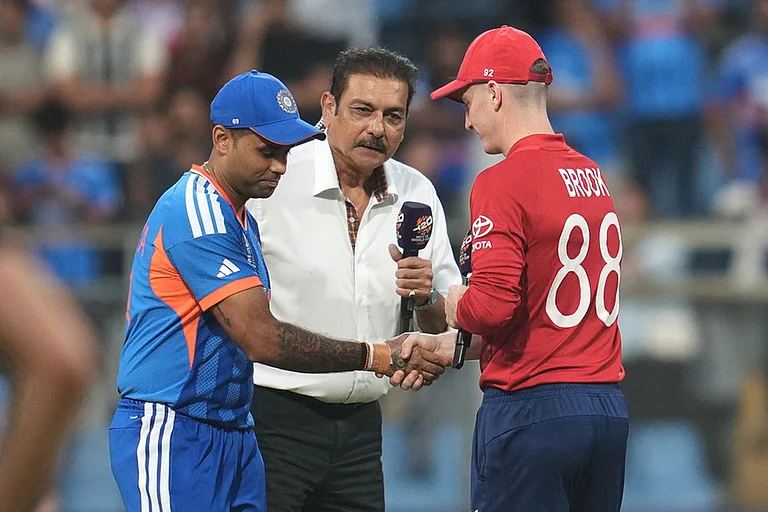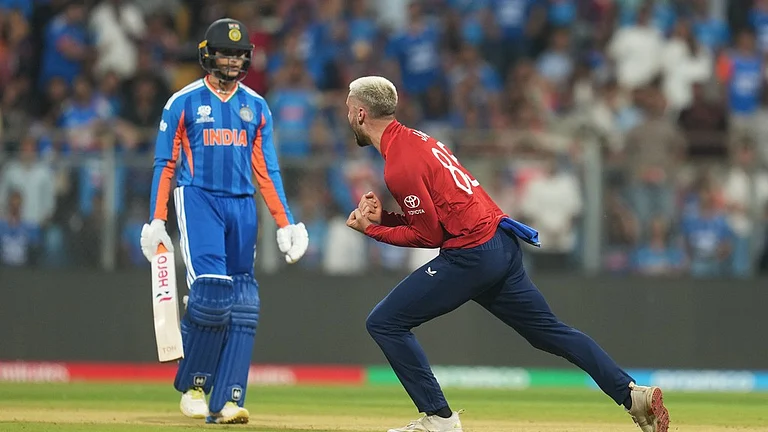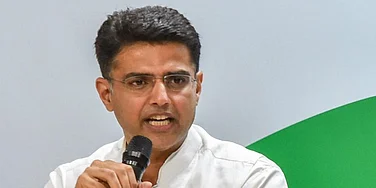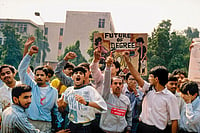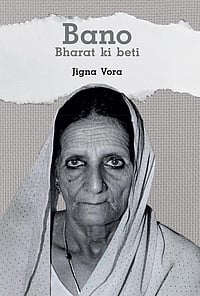There is a lot of talk across the liberal –secular– Left and the anti-establishment circles that the Indian judiciary is “pliant” to the incumbent regime. There are personal experiences of certain activists which testify it. Chief Justice of India Dhananjay Y. Chandrachud, too, in one of his recent statements that the lower judiciary is working with a “sense of fear”, particularly in granting bails, seems to have endorsed it.
Nonetheless, there are instances contrary to the above, too. One needs to put such instance of personal experiences, from the higher judiciary, in public domain.
The following story, a latest one, is a testimony to the fact that despite a triumphant Hindutva and the arguably “pliant” Indian judiciary, the Muslim Personal Law is something the higher judiciary is still scared of questioning even the most evidently regressive and unhistoric parts of it.
This is what, precisely, once again, came out of a verdict of the Allahabad High Court on September 21, 2022, which set aside a trial court verdict of May 2022, and the apex court refused on 17 October 2022, to interfere into it.
Here goes the story
This is the story of Muslim Personal Law prevailing over the secular law in the higher judiciary, even while the case was filed, tried and adjudicated upon, in the trial court under secular law.
Nine years ago, my sister asked me to adopt her three-month-old daughter. I accepted her offer with a rider, of course, that there must be some legal formalities so that she does not renege on it in future (‘Legally Mine’, Indian Express, March 8, 2014). [In other words, it was almost two years before the Juvenile Justice (Amendment) Act came into force from January 1, 2016]. However, after the deed was signed, she began to extort money and subjected me to other kinds of blackmail. I ended up paying her up several lakhs of rupees. Eventually, I put my foot down and refused to be cowed down by her blackmail. She then filed a series of cases against me.
Five and a half years later, she filed a petition in the Family Court in late August 2019 under the Guardians and Wards Act 1890, a secular law [This was preceded by a Habeas Corpus case in the Delhi High Court in early August 2019, which was dismissed. They didn’t avail of the visitation right ordered by the Delhi High Court]. In its 29-page-long judgment in May 2022, the trial court ruled that the custody of the girl should remain with us, her foster parents, till she attained the age of 18 years. The trial court allowed her biological parents to spend a fortnight with their daughter in Aligarh, at their own expense, during summer vacations. The trial court judge interviewed the girl, first alone in her private chamber, for half an hour and then immediately after that in the presence of both biological and foster mothers, along with their advocates. The judge found the eight-and-a-half year-old girl to be intelligent, understanding and informed, with good manners, and she was receiving best possible education at her foster home. Moreover, the documents put on record of the trial court testified to the fact that my sister was extorting money from me; and her husband, the co-petitioner admitted as much before the trial court. Finally, while initiating the pleadings and cross-questioning, and before arriving at her judgment, the trial court categorically stated that none of the parties to the dispute did invoke the Muslim Personal Law. Apart from the notarised deed, there were other documents and statements of the petitioners, which only proved that they had given away their three-month-old daughter on their own wish and mutual consent.
The dispute reached the Allahabad High Court. However a division bench, in almost a maiden brief argument, set aside the trial court verdict, simply presuming that the Muslim Personal Law prohibited adoption. The bench did not even call for the records of the trial court let alone look into them. The high court also ignored the fact that the petition was filed under the secular law of the land. The “custody” was arbitrarily taken as “adoption”. The high court went on to exercise its discretionary power invoking parens patriae for the reasons best known to the judges.
To add salt to my injury, so to say, the bench accused me of not letting the biological parents meet their daughter, turning a Nelson’s eye to fact that they did keep meeting the girl till they filed the case in August 2019. In fact, the biological parents kept spending each summer with the baby, at our home. This was mutually admitted by both parties, corroborated by other crucial documents, now part of the trial court records. The biological parents, in fact, chose not to visit and meet her despite the Delhi High Court having ordered them to do so, in early August 2019. In the subsequent summers, Covid-19 had struck.
My sister went to the extent of initiating a criminal case of kidnapping against me in October 2021, in an executive court, located physically, just adjacent to the Family Court, wherein a civil case of custody was already sub-judice, since August 2019, initiated by herself, two years prior to this criminal proceeding.
After the girl was handed over to her biological parents in October 2022 in compliance with the high court order a month earlier, she has stopped going to her school, one of the best one in the region. A bright student of standard IV, she missed her November examinations. Earlier, during 23 June to 9 July 2022, the baby was in their custody. During the trial in the Family Court, on the Saturdays of April-May 2022, they had been meeting the baby in the mediation centre of the district court. This well-documented fact too seems to have been missed by the High Court verdict of September 21, 2022. The baby was not interviewed by the High Court to know of her experiences during the fortnight long custody of the baby girl with the biological parents.
When I moved to the Supreme Court, the top court, on October 17, 2022, said, “We see no reason to interfere.” Understandably because, the Muslim Personal Law commands such a tremendous power on the minds of the higher judiciary that the Supreme Court found it beyond its call to look into the evident factual discrepancies in the high court verdict.
Let me add here that if the Muslim Personal Law would go by the precise history of Zayd who was fostered by the Prophet Muhammad, then it will find that the wish of the adopted would prevail. Because, history testifies that, it was the wish of Zayd, in accordance of which he continued in the custody of the Prophet, rather than being sent back to his biological parents. This specific aspect is pretty clear both in Quran and in a well-researched slim biography of Zayd, by Prof. David Stephan Powers of the Cornell University, published in 2014. But that specific reform, rather a clarification of historical fact, has to be kept in abeyance by the Muslim Law Board, just as it stubbornly refuses to do away with the un-Quranic instant triple talaq (ITT) or divorce. Sadly, some of the better known Muslim law commentators of the day are also not helping the judiciary in removing such misconceptions; rather, they too are encouraging the Muslim Law Board to continue to perpetuate regressivism.
A repeat of the Shah Bano Story?
It is worth recalling that in May 1986, the Parliament had overturned the Supreme Court verdict of April 1985 for maintenance, in the name of Muslim Personal Law. Ever since then, nobody, not even the tallest of the powerful Muslim clergy, looked back as to what happened to the life of the old hapless lady, Shahbano Begum (1916–1992), after 1986. None of us, scholars, journalist and authors ever bothered to write a comprehensive biography of Shahbano Begum and her sufferings. To my knowledge, no popular or influential national English language news periodicals published a detailed obituary of Shah Bano. In this regard, I am holding back the story of self-confessed manipulations made by the clergy in misleading and prevailing upon the then Prime Minister Rajiv Gandhi and getting the judicial verdict nullified through legislation. For these details, one may refer to the Urdu memoir, Kaarwaan-e-Zindagi (1988, vol. 3, chapter 4) of Ali Miyan Nadvi (1914–1999).
This important fact still remains little known that it was only after the old lady was driven out of her home in her 60s, she approached the court seek maintenance from her husband, an affluent advocate himself, who had pronounced the un-Quranic ITT on her, inside the court in Indore, in the presence of the judge hearing the case of maintenance. Thus, Mohammad Ahmad Khan unburdened himself from the liability of paying maintenance to Shah Bano Begum. This was in the late 1970s.
Similarly, as my own story clearly testifies, the Muslim Personal Law and its defendants and upholders among the higher judiciary of India need not bother about the adverse psychological impact and all other adversities that the nine-year-old girl is undergoing. This includes her being deprived of quality schooling. There is every possibility that she may undergo multiple kinds of academic losses too. Yet, the Muslim Personal law, as codified in India in 1937, at Jinnah’s behest, to create for him a “pan-Indian Muslim identity”, must be upheld, even in the cases filed under secular laws. This is the message that has come from the higher judiciary, too, in this case. They saw “no reason to interfere”, I repeat.
I am sure mine will not be a one off case. The records of our judiciary must be full of such cases where injustices are being meted out in the name of personal laws. I have lost to the stranglehold of personal laws over the secular laws, but how many more must suffer before the bell rings?
Is it not the right time to ask if the personal laws, in their current form and shape, are worth fighting for? Shouldn’t an individual and her rights be at the core of any law, personal or secular, and not the collective ego of a community? If the religious leaders and scholars don’t take the required steps to change and reform the personal laws, do they have a moral argument against State intervention that may come sooner than later.
Also, a pertinent point to ponder is that even the secular laws don’t recognize the rights of the fostering parents whose tremendous emotional investment of long nine years have heartlessly been pushed down the drain. There are unmitigated rights to the biological parents, howsoever a proven financial blackmailer is, as in the present case.
There is no law to hold the biological parents accountable for whimsically bludgeoning the contract, as an afterthought, and in the name of religion and personal law. As if the personal law didn’t predate their offer and handed over the three-month-old little baby in 2014.
May one expect that the Apex Court will consider re-visiting the case?



